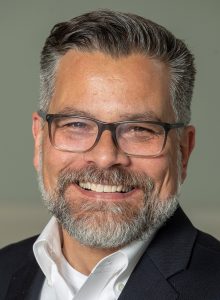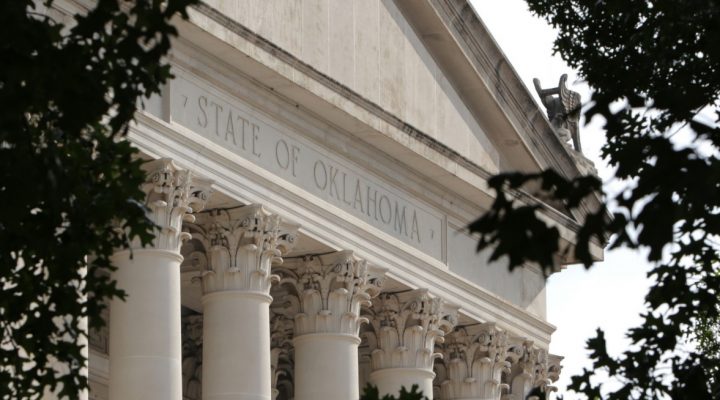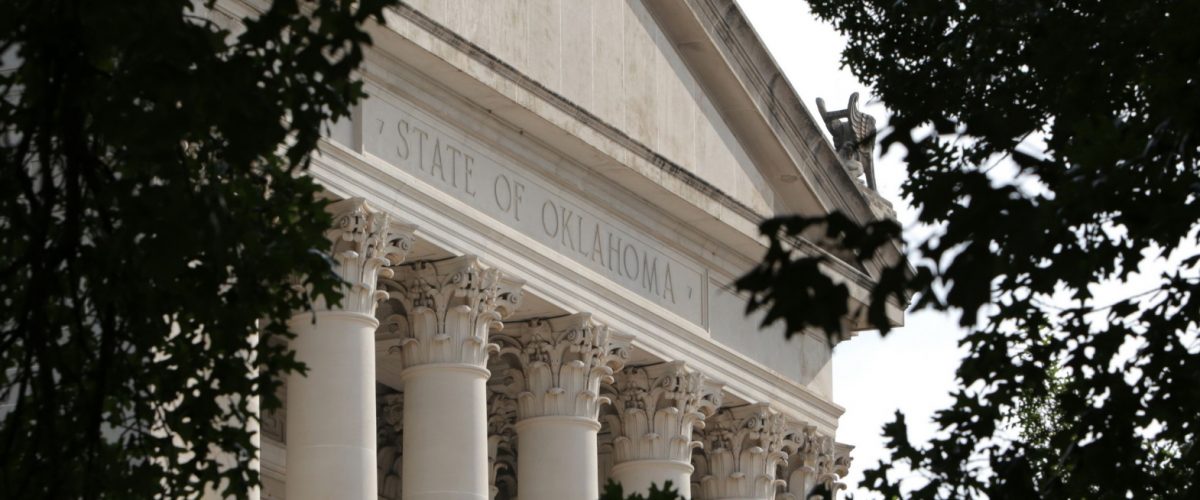Parents, pastors and defenders of public education filed suit against state education officials in Oklahoma District Court July 31, seeking to reverse approval of St. Isidore of Seville Catholic Virtual School as the nation’s first religious charter school.
Plaintiffs want the court to block St. Isidore from operating as a charter school, stop the state’s charter school board from contracting with the school, and prevent the state from funding it with taxpayer money.

Rachel Laser
“Charter schools are public schools, not Sunday schools,” said Rachel Laser, president of Americans United for Separation of Church and State, who called the planned school “unconstitutional and un-American” in a Monday news conference. AU announced its plan to sue in June after the state’s Virtual Charter School Board approved the school.

Daniel Mach
Daniel Mach, director of ACLU’s program on freedom of religion and belief, called the idea of a religious charter school “a constitutional oxymoron.”
“The unprecedented decision to approve this religious charter school violates the separation of church and state and tramples the rights of Oklahoma taxpayers, students, and their families,” he said.
The suit claims St. Isidore would break a number of state laws, including the obligation to welcome and serve all students and the commitment not to discriminate in admissions, discipline and employment based on religion, sexual orientation and gender identity.
The suit also says St. Isidore has not complied with school board regulations requiring public schools to serve students with disabilities, and that the school will indoctrinate and evangelize its students through a curriculum created by the Department of Catholic Education of the Archdiocese of Oklahoma City.

Lori Walke
“Our churches already have religious freedom to start our own schools, and parents have the freedom to send their children to those schools,” said Lori Walke, a plaintiff who serves as senior minister of Mayflower Congregational United Church of Christ in Oklahoma City.
She warned entangling the government in religious education “endangers the religious freedom for all of us.”
Oklahoma Gov. Kevin Stitt, whose father was the pastor of an independent charismatic church in Norman, praised the board’s decision to create the school. “This is a win for religious liberty and education freedom in our great state,” he said in June.
But two plaintiffs cited their Baptist traditions in arguing St. Isidore represents a major loss for America’s historic understanding of religious freedom.

Bruce Prescott
“The government should never fund discrimination,” said Bruce Prescott, a retired pastor, former seminary professor and former executive director of Mainstream Oklahoma Baptists.
“Religious schools — like houses of worship — should be funded through voluntary contributions from their own membership, not money extracted involuntarily with state taxes from members of a religiously diverse community,” he said.

Mitch Randall
Mitch Randall, executive director of Good Faith Media and former pastor in Norman, has a personal connection to government-run schools that enforce religion. A citizen of the Muscogee (Creek) Nation, his great grandfather attended the Chilocco boarding school, which required weekly religious attendance.
“Coming from the Baptist tradition, the separation of church and state is a bedrock principle protecting religious liberty for every citizen,” Randall said. “It is appalling to think state leaders would reopen a door to a time when tax dollars were used to publicly fund the advancement of religion.”
Lori Walke described the brand of religious freedom embraced by the school’s planners as, “Don’t tread on me, but I’ll tread on thee.”
Some Christian conservatives who support St. Isidore hope the legal battle will eventually wind up before a sympathetic U.S. Supreme Court, where conservative justices have rewritten America’s educational jurisprudence over the past six years with three rulings requiring public tax dollars to fund private Christian schools: Trinity Lutheran Church of Columbia v. Comer (2017), Espinoza v. Montana Department of Revenue (2020) and Carson v. Makin (2022).
Supporters cheer and critics fear a future in which St. Isidore-type schools will pop up in states across the country.
But legal experts involved in the Oklahoma lawsuit say the approval of St. Isidore was so blatantly unconstitutional that the case never will get anywhere near the high court.
It’s not clear who will defend St. Isidore, but representatives of First Liberty Institute and the Notre Dame Law School Religious Liberty Initiative reportedly have been following the case.

Erika Wright
Plaintiffs include parents whose children have attended Catholic schools and groups that support public education: the Oklahoma Parent Legislative Action Committee; and Erika Wright of the Oklahoma Rural Schools Coalition. They are being represented by attorneys from Americans United for Separation of Church and State, the American Civil Liberties Union, Education Law Center, and Freedom From Religion Foundation.
These groups fear further financial harm to Oklahoma’s underfunded public schools. The group Pastors for Texas Children reports Oklahoma ranks 48th in the nation for per-student spending on public education.
AU’s Rachel Laser sees St. Isidore as part of a larger “full-on assault on church-state separation,” calling religious charter schools “the next frontier” in the “Christian nationalist agenda to infuse Christian into public schools.”
Related articles:
Oklahoma’s OK for nation’s first religious charter school to be challenged in court
Oklahoma could have nation’s first publicly funded Catholic charter schools
Diane Ravitch wants you to think of public schools like police or fire departments
What really happened at that meeting with the Oklahoma superintendent of schools is worse than you’ve heard | Analysis by Lindsay Bruehl
Oklahoma superintendent of schools says Tulsa Race Massacre wasn’t due to color of anyone’s skin
Is it now illegal to mention the Tulsa Race Massacre in the classrooms of Oklahoma? | Opinion by Alan Bean


